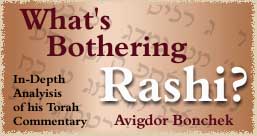

Back to this week's Parsha| Previous Issues
Parashas Haazinu
Best wishes for a Shanah Tova We asked in Parashas Nitzavim from Deuteronomy 29:14: "Not with you alone do I seal this covenant and this imprecation. But with whoever is here, standing with us today before Hashem our G-d and with whoever is not here with us today." RASHI "And whoever is not here": RASHI: and even with generations that are destined to be [born]. This is somewhat of a mystical interpretation. Why does Rashi interpret the verse this way? Why not say simply "those that are here physically now and those that are not physically present" ? An Answer: This is really not a difficult question. If we look at the very first vere in Parashas Nitzavim we find that it says: " You are all standing this day before Hashem your G-d etc." So all the Jews alive at that time were present at Moses' talk. Therefore the only people who could be referred to when the Torah says "whoever is not here with us today..." must perforce be those not yet born. Now to this week's sedra, this time a difficult, but very logical question and answer:
Parashas Ha'azinuDeuteronomy 32:31 "For not as our Rock is their rock - yet our enemies judge us." RASHI "All of this the enemies should have understood, that is was Hashem who delivered them (the Israelites) into their hands and the victory is neither theirs nor their god's, because until now their gods could achieve nothing against our Rock. 'for not as our Rock is their rock.' The word "tzur" in the Scriptures always means rock." Rashi explains the flow of the verse. But then he adds the meaning of the Hebrew word "tzur." This is very strange. Thos word appears severakl times in the Torah before this. And it appear five times in this sedra alone before this verse. Why did Rashi wait until now to tell us its meaning? Think. Review the other verses and compare them with our verse. Good luck! And a Good Year and an easy fast. May Hashem accept our prayers.
Back to this week's Parsha| Previous Issues Permission is granted to redistribute electronically or on paper, provided that this notice is included intact.
For information on subscriptions, archives, and
http://www.shemayisrael.co.il |